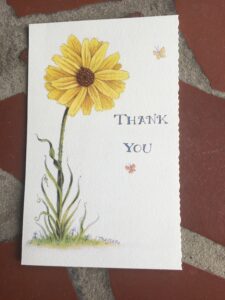 Working with six motivated seniors who banded together and presented me with a handwritten thank-you note before the start of their class presentation. It covered the book we read together, An Everyone Culture: Becoming a Deliberately Developmental Organization by Robert Kegan and Lisa Laskow Lahey.
Working with six motivated seniors who banded together and presented me with a handwritten thank-you note before the start of their class presentation. It covered the book we read together, An Everyone Culture: Becoming a Deliberately Developmental Organization by Robert Kegan and Lisa Laskow Lahey.
Leading up to their presentation, this group of students had already impressed me with several actions. For example, during our hourly in-person book discussion sessions over a four-week period, the students:
- Took turns talking with minimal prompting on my part.
- Rotated note-taking responsibilities, without me having to make any assignments.
- Set up a folder on Google Drive where we could share the notes and other documents, which made file sharing so much easier.
- Self-organized into two smaller teams to find and prepare case studies that illustrated the book’s themes and concepts.
They also found time to meet on their own before the class presentation to practice. (I missed it because of a prior client commitment.)
They were a model group in so many ways.
Yet, of all of these actions, I appreciate their handwritten note the most.
Why?
Handwritten notes are a tradition worth preserving because they signal recognition. My late mother was a big proponent of hand-written letters and notes. The act of finding appropriate stationery, pen and postage stamp and then sitting down to write a makes one pause to reflect on the person you’re acknowledging and the situation. With the message, you generally want to be kind, genuine and personal, which means you need to think, which helps embed the purpose of the note and the memory in your brain.
Handwritten notes are brain-friendly for the receiver too. Handwritten notes require more effort to read than an email or text message. When you’re the receiver, you’ve got to open the envelope and read (or decipher the handwriting if you’re reading a note from me). That plus the surprise of getting correspondence that’s not a bill or junk mail gives the handwritten note a sense of novelty, which your brain enjoys.
For the sender, handwritten notes now require extra effort to do, which adds to their uniqueness and value. For instance, in the case of the note I received from the students, six individuals not only signed the card but also wrote a comment describing what they liked about their experience in working with me.
And to make matters more challenging, they had to overcome two production hurdles that many of us face with handwritten notes.
- The absence of spell check, which is the big advantage of writing digital notes.
- Writing clearly enough so their handwriting is legible.
Plus, many of us often encounter a distribution obstacle with handwritten notes these days – tracking down a mailing address. And then you need to find postage and a mail drop.
Have you noticed how many business cards now exclude a physical address? That’s stymied me a few times when I’ve wanted to write someone a note. I’ll often send the individual an email message requesting a mailing address, which dilutes the surprise factor when the individual gets something in the mail.
Nonetheless, however the handwritten notes arrive – by post or by hand with or without advance notice – they are worth sending and receiving and appreciating.
Whenever these students join the workforce after graduation, they seem well prepared to make a positive contribution to their new employer’s culture. That’s because all six of them already know and demonstrate the power of thanks.
My thanks to them, and also to their professor, Dr. Angela Passarelli, Assistant Professor of Management, who asked me to serve as one of her four book circle mentors. She also served as a great role model for recognition by regularly acknowledging us mentors as well as her students for our efforts and contributions.
For a helpful book on the topic of recognition, check out The Power of Thanks: How Social Recognition Empowers Employees and Creates a Best Place to Work by the Globoforce executives Eric Mosely and Derek Irvine.
What’s your experience with handwritten notes, either as a sender or receiver? What’s your take on the point of view expressed here, or do you have a different perspective?

Great article, Liz! Your students were an impressive group. Because we so seldom receive thank you notes these days, when they do come, the sender always stands out. I know I keep thoughtful notes on my desk that I have received and look through them from time to time.
Thanks for underscoring this important tradition
Karen